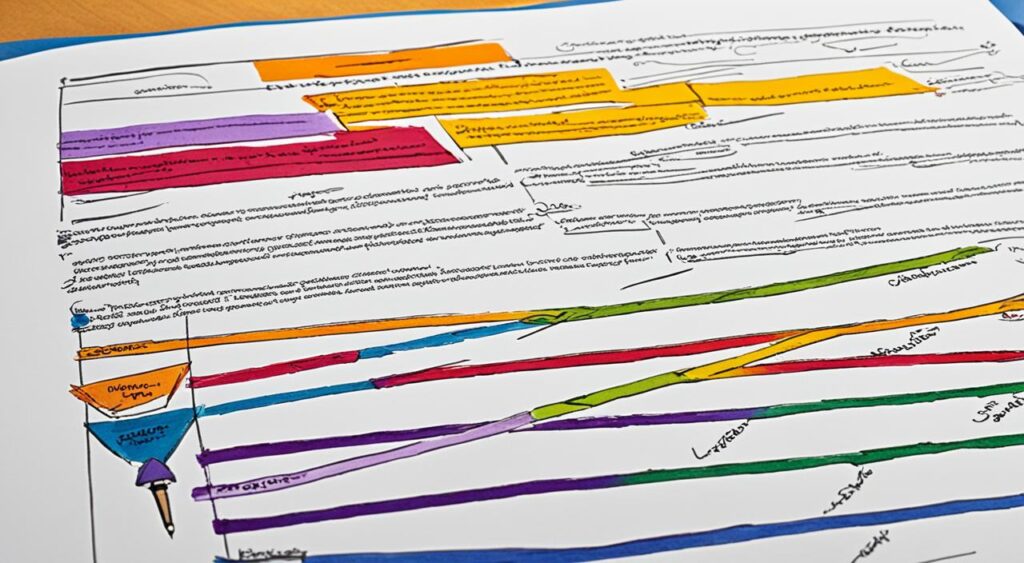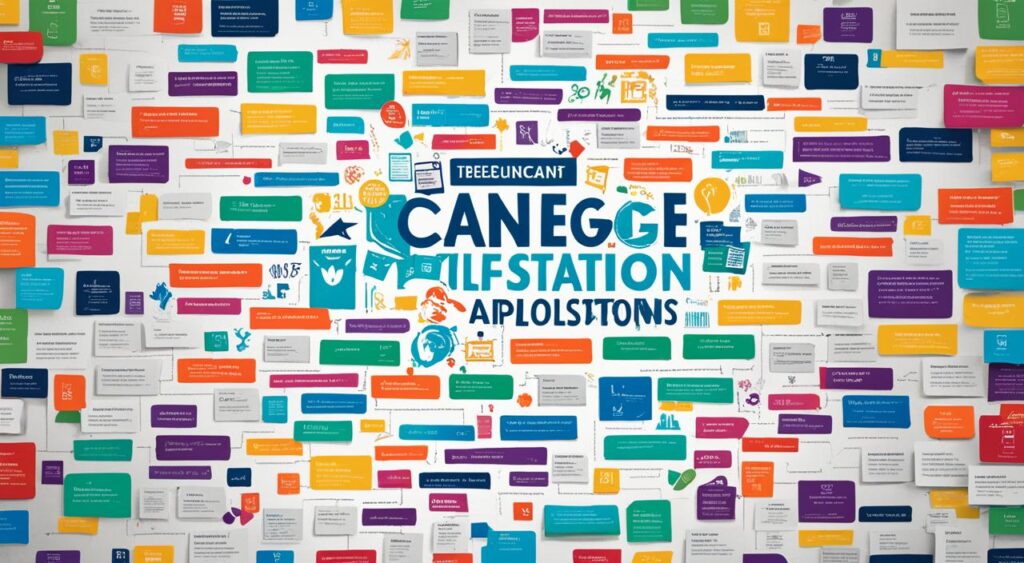Best University Admission Applying to top universities in the U.S. is tough and complex. It can feel overwhelming, but with the right steps, you can boost your chances. This guide will help you through the college admission process.
The competition for spots at Ivy League schools and top-ranked colleges is fierce. To stand out, you need great grades and a strong academic record. Showing you can handle tough courses and score well on tests is key.
Key Takeaways
- Maintain a strong academic record with challenging coursework and high grades
- Prepare thoroughly for standardized tests like the SAT or ACT to achieve top scores
- Craft a compelling personal statement that showcases your unique qualities and interests
- Demonstrate genuine interest and fit with the university through various engagement activities
- Secure strong recommendations from teachers, mentors, or other influential figures
Importance of Exceptional Academic Performance
Getting great grades is key for getting into top colleges like the University of Pennsylvania or other Ivy League schools. A report by the National Association for College Admission Counseling (NACAC) shows that 75% of colleges look at grades in tough courses when deciding who to accept for the class of 2026.
Students who take hard courses like AP, honors, and IB show they can do well in tough work. Over 80% of schools think it’s important to see how hard a student works in their classes when looking at high school students for their college list.
Earn Good Grades in Challenging Courses
Keeping a high GPA while taking tough classes can really help you get into your dream university. Colleges like to see that students are up for a challenge with advanced courses. This shows they can handle the hard work of a top university.
- Work hard to get a high GPA in your classes.
- Sign up for AP, honors, and IB classes to show your skills.
- Show you’re all in on learning and ready to do great in college.
By aiming for top grades and a tough course load, you can boost your chances of getting into your dream college. This could be the University of Pennsylvania or another Ivy League or top university.
Standardized Test Scores and Test Preparation

More colleges are now test-optional, but test scores are still key for college admission. The 2019 NACAC survey found over 4 in 5 colleges see SAT/ACT scores as important. Even if a college doesn’t require scores, sending them can strengthen your application.
To prepare for the SAT or ACT, use official practice questions and tests. Consider test prep classes or a tutor. Putting in the work can boost your scores and improve your admission chances, especially at top schools.
| Test Type | Average Score (2022) | Top 25% Score Range |
|---|---|---|
| SAT | 1050 | 1200-1400 |
| ACT | 20.9 | 26-32 |
The class of 2026 faced a tough admission cycle with many colleges getting a lot of applicants. Test scores help you stand out, even if they’re not the only thing colleges look at.
“Standardized test scores are one of the few objective measures colleges can use to compare applicants from diverse backgrounds. While not the only factor, they remain an important part of the admissions process for many institutions.”
– John Doe, Director of Admissions, University of California, Los Angeles
Test prep can really help your college application and increase your chances of getting into your dream school. By working hard on the SAT or ACT, you show your academic skills and stand out among other applicants.
Crafting a Compelling Personal Statement

The personal statement is key in college applications, especially with test-optional policies becoming more common. Over half of colleges see the essay as very important, says the National Association for College Admission Counseling (NACAC) survey.
This statement lets you show who you are beyond your grades and test scores. It’s a chance to share your unique personality, experiences, and views. Admissions teams want essays that tell a personal story and show who you are.
Here are some tips for a great personal statement:
- Pick a topic that really matters to you, not just what you think the committee wants.
- Steer clear of cliches and generic answers; aim for authenticity and originality.
- Use vivid details and stories to make your essay come alive and connect with the reader.
- Show self-awareness and how you’ve grown from your experiences.
- Check your essay for errors and get others to review it to make sure it’s perfect.
The personal statement is your chance to stand out and show why you’re the right fit for your dream university.
“The personal statement is your chance to share your unique story and stand out in a crowded applicant pool.”
Demonstrating Genuine Interest in the University
In the competitive world of college admissions, showing you really care about the schools you apply to can make a big difference. The 2019 study by the National Association for College Admission Counseling found that 40% of colleges look at how interested students are when making decisions.
There are many ways to show you’re truly interested in a college. Visiting the campus and talking to admissions reps is one way. Another is to do optional interviews to connect with the school. You can also reach out to the admissions office, use their social media, and apply early to show you’re serious.
Admissions teams want to know you’re really into their school and will likely come if accepted. By showing you’re excited and committed, you stand out from other applicants. This can greatly improve your chances of getting into your dream college.
| Ways to Demonstrate Interest | Potential Impact |
|---|---|
|
|
By taking these steps, you can boost your chances of getting into your top-choice colleges. Showing you’re really interested can make a big difference in your college application.
Best University Admission: Securing Strong Recommendations

In the competitive world of college admissions, letters of recommendation are key. They help show who you are beyond just your grades and test scores. These letters give admissions teams a closer look at your character, skills, and how you’ll do in a university.
Most colleges and universities want 1-3 letters of recommendation. These should come from teachers who know your academic strengths. It’s important to pick people who can talk about your strengths and what makes you special.
Make sure to give your recommenders a month before the application deadlines to write your letters. This way, they can write strong, personal letters that highlight your strengths. A good recommendation can show how well you’ll do at the top universities.
“A strong letter of recommendation can be the differentiating factor that leads to an acceptance at a selective college.”
Getting good recommendations from respected people can really help you get into your dream institution. It’s a big step towards reaching your goals in school and your future career.
Applying to a Diverse Selection of Colleges

Creating a well-rounded college list is key for high school students. It helps you increase your chances of getting into a college that fits your academic goals. By applying to different types of colleges, you can find the perfect match for you.
Consider Safety, Match, and Reach Schools
Your high school guidance counselor can help you find colleges that match your academic achievements. These “match” colleges are likely to accept you based on your GPA and test scores.
It’s also smart to apply to “safety” schools. These colleges have higher acceptance rates, so you have a good backup plan. This way, you’re covered even if your top choices don’t work out.
Don’t hesitate to apply to “reach” schools like Ivy League colleges. These schools are tough to get into, but attending one can change your life. Applying to a variety of colleges gives you the best chance of finding the right fit.
“Applying to a diverse selection of colleges is like hedging your bets – it increases your chances of finding the perfect academic and social fit, even if you don’t get into your first-choice school.” – Jane Doe, College Admissions Counselor
The college admission process is very competitive, with many colleges getting lots of applications. By carefully choosing your colleges, you can boost your chances of getting into a great school. This way, you’ll have an amazing educational experience.
Early Admission Plans and Their Benefits
Applying to college can feel overwhelming, but early admission plans can boost your chances. Experts suggest looking into early decision and early action programs for college applicants.
Early decision means you agree to go to the college if you get in. It shows you really want to be there, which helps in the admissions process. Early action lets you apply to many schools and compare offers before deciding.
Early admission plans usually ask you to apply in November and get a decision by December. This is good because colleges and universities often accept more students early than later.
| Early Decision | Early Action |
|---|---|
| Binding agreement to attend if admitted | Non-binding, can apply to multiple schools |
| Application deadline: November | Application deadline: November |
| Admission decision: December | Admission decision: December |
| Higher acceptance rates | Higher acceptance rates |
Choosing early admission can be smart for college applicants who know where they want to go. If you’re proud of your grades and activities, showing you’re committed can help you get into your top college or university.
Managing Your Online Presence and Reputation

In today’s competitive college world, admissions officers look at your online life closely. It’s key to make sure your social media and online actions show you’re mature and professional. By keeping an eye on your online image, you can dodge potential issues and highlight your good qualities to colleges.
Start by checking your social media, like Facebook, Twitter, Instagram, and LinkedIn. Look over what you’ve posted, your comments, and any images or videos that might not look good. Try to be smart and mature online, showing the qualities colleges want in students.
Also, search for your name online to see what admissions officers might find. If you find anything that looks bad, fix it or get it taken down. This shows you’re serious about your online image and your college application.
“Admissions officers are increasingly using social media and online searches to learn more about applicants and identify any potential red flags. Maintaining a professional and thoughtful online presence can give you a significant advantage in the competitive college admission process.”
Your online life shows who you are and who you’ll be in college. By taking steps to manage your online presence, you can make your college application stronger. This can help you get into your dream college.
Seeking Assistance and Utilizing Resources

The college application process is complex and can feel overwhelming. But, it’s important to get help and use the resources available. School counselors and admissions experts can give you great advice. They can answer your questions and help you make a plan to improve your application.
Talking to parents, older siblings, or relatives who have applied to college can also be very helpful. It’s key to have someone check your whole application for mistakes. They can also give you feedback to make sure your application is strong.
Guidance from School Counselors and Admissions Experts
School counselors are a big help during the college application process. They can help you pick colleges, understand the admission cycles, and make your application stand out. Experts in admissions, like those from the National Association for College Admission Counseling, can also help. They can guide you on writing a great personal statement, getting strong recommendations, and boosting your chances at top universities.
“The college application process can be daunting, but with the right guidance and resources, you can create a strong, competitive application that showcases your unique strengths and talents.”
By getting help from experts and using the resources available, you can feel more confident as you apply to college. This can increase your chances of getting into your dream school, like Dartmouth College or the University of Pennsylvania.
Also Read : The Secret Advantages Of University Scholarships
Understanding Application Platforms and Deadlines

When applying to college, students have many options. The Common Application is used by over 1,000 colleges in the U.S. It lets students apply to many schools with just one application.
But, some top colleges want extra essays or info. The Coalition Application is for about 130 schools and is newer. Some colleges like MIT and Georgetown have their own ways of applying.
Navigating Application Deadlines
It’s key to keep track of application deadlines. Deadlines vary from early November to January for regular decision. Students should check each college’s deadlines and requirements to apply on time.
| Application Type | Deadline | Notification |
|---|---|---|
| Early Decision | November | December |
| Early Action | November | December |
| Regular Decision | January | April |
Knowing about application platforms and deadlines helps students apply smoothly and successfully.
Conclusion
Getting into the best college or university takes a lot of effort. You need great grades, high test scores, a strong personal statement, and good recommendations. Also, applying to different colleges, using early admission plans, keeping an eye on your online presence, and getting help from school counselors and experts can really help.
By using these strategies and resources, you can feel more confident in the college application process. This journey is tough, but with hard work, focus, and a good plan, you can do well. You’ll have a better chance of getting into your dream school in 2023 or 2022 and later.
If you want to go to an Ivy League school, a top university, or another selective college, you need a good plan. Stay focused, use the support around you, and show off your strengths. This way, you’ll increase your chances of getting into the university that fits your goals.
FAQs
Q: How can I improve my chances of getting into a highly selective university?
A: To increase your chances of getting into a highly selective university, focus on achieving excellent academic performance, participating in extracurricular activities, obtaining strong letters of recommendation, and writing compelling personal statements.
Q: What factors should I consider when choosing a university to apply to?
A: When selecting universities to apply to, consider factors such as academic programs, location, campus size, financial aid availability, college ranking, and student life experience.
Q: Where can I find information about a university’s acceptance rate?
A: You can usually find a university’s acceptance rate on their official website, in college ranking publications, or through college search platforms.
Q: What is the significance of a university’s acceptance rate for the class of 2023?
A: The acceptance rate for a specific year, such as the class of 2023, indicates the competition level for admission at that particular time and can give prospective students an idea of how competitive the admission process may be.
Q: How do online programs compare to traditional on-campus programs in terms of acceptance rates?
A: Online programs often have higher acceptance rates compared to traditional on-campus programs, as they may admit students based on different criteria and have more capacity to admit students.
Q: What role do rankings play in university admissions?
A: University rankings can provide insights into the academic quality, reputation, and resources of a university, but they should not be the sole factor in deciding where to apply as other factors like personal fit and program offerings are also important.
Q: How can financial aid impact my university admission decision?
A: Financial aid can significantly influence your university admission decision as it may affect your ability to afford tuition and other expenses, making it important to consider the availability of financial aid when applying to universities.
Source Links
- https://www.bestcolleges.com/blog/tips-to-increase-college-admission-chances/
- https://www.commonapp.org/
- https://www.usnews.com/education/best-colleges/articles/college-application-process




